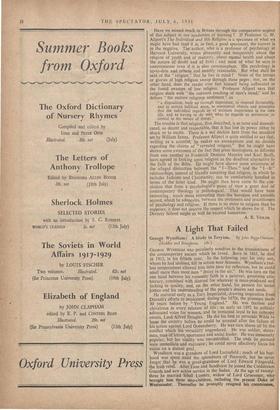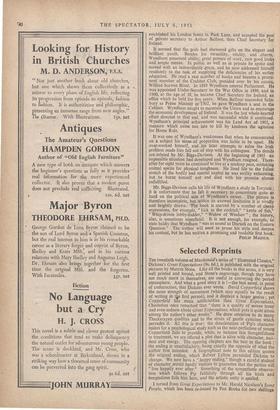A Light That Failed
George Wyndham: A Study in Toryism. By John Biggs-Daviv)n. (Hodder and Stoughton. 18s.) GEORGE WYNDHAM was peculiarly sensitive to the transitoriness of the contemporary society which he loved. Born in 1863, he died in 1913, in his fiftieth year. In the following year his only son, whom he had idolised, fell in action near Soissons. Wyndham's rest- less temperament allowed him little time for reflection, but he coul& smell more than most men " decay in the air." He was torn on the, one hand between his romantic faith in a paternal, governing aris- tocracy, combined with distrust for whatever is mass-produced and lacking in quality, and, on the other hand, his passion for social justice and his understanding of the people's desires and needs. He matured early as a Tory Imperialist, drawing inspiration from' Disraeli's efforts to implement, during the 1870s, the promises made' 30 years before by " Young England." He was fearless and chivalrous in every relation of life ; as early as 1892 he publicly advocated votes for women, and he remained loyal to his unhappy cousin, Lord Alfred Douglas. He did his best to persuade Wilde to leave the country before he could be arrested after the failure of his action against Lord Queensberry. He was torn above all by the conflict which his versatility engendered. He was soldier, states- man, man of letters, sportsman and social leader. He was immensely popular, but his vitality was uncontrolled. The ends he pursued were immediate and exclusive ; he could never effectively focus his vision on a distant goal. established his London home in Park Lane, and accepted the post of private secretary to Arthur Balfour, then Chief Secretary for Ireland.
It seemed that the gods had showered gifts on the elegant and brilliant youth. Besides his versatility, vitality, and charm, Wyndham possessed ability, great powers of work, rare good looks and ample means. In public as well as in private he spoke and moved with an indescribable grace, and he now addressed himself resolutely to the task of supplying the deficiencies of his earlier education. He read a vast number of books and became a promi- nent member of the Crabbet Club, presided over by his cousin, Wilfred Scawen Blunt. In 1889 Wyndham entered Parliament. He was appointed Under-Secretary to the War Office in 1898, and in 1900, at the age of 38, he became Chief Secretary for Ireland, an office which he held for five years. When Balfour succeeded Salis- bury as Prime Minister in '1902, he gave Wyndham a seat in the Cabinet. Wyndham sought to maintain the Union and to encourage the economic development of Ireland. It was the last whole-hearted effort directed to that end, and was successful while it continued. Wyndham's principal achievement was his Land Act of 1902, a measure which came too late to kill by kindness the agitation for Home Rule.
It was one of Wyndham's weaknesses that when he concentrated on a subject his sense of proportion was liable to be upset. He over-worked himself, and his later attempts to solve the Irish problem made him fall out of step with his colleagues. The details are related by Mr. Biggs-Davison. At the beginning of 1905 an impossible situation had developed and Wyndham resigned. There- after for eight years he continued to live at a madcap pace, mistaking animal spirits for physical toughness. He lived life to the fullest stretch of the bodily and mental capital he was swiftly exhausting, but he burnt himself out and died with his promise almost unfulfilled.
Mr. Biggs-Davison calls his life of Wyndham a study in Toryism ; it is unfortunate that he felt it necessary to concentrate quite so hard on the political side of Wyndham's career. The picture is therefore incomplete, but within its avowed limitation it is vividly and brightly drawn. The book is marred by a number of cheap expressions, for example, " kick in the cocktail," " kettle of fish," " Whip-driven lobby-fodder," " Widow of Windsor " ; the history, also, is sometimes superficial. It is not enough, for example, to state baldly that Wyndham " was as sound as Disraeli on the Eastern Question." The author will need to prune his style and deepen his content, but he has written a promising and readable first book. PHILIP MAGNUS.























































 Previous page
Previous page